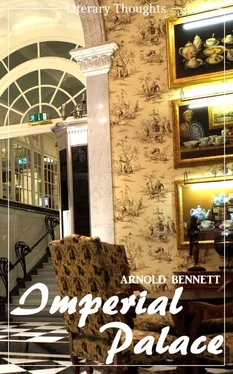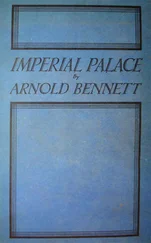He felt inclined to try to break down her discretion. Not in order to get at secrets, though he divined that there were secrets, but simply for the pleasure of breaking down her discretion. A slight, impish wantonness in him. He checked it. The disclosure about Miss Powler’s professional sojourn at Sir Henry’s house was very agreeable to him. It would help him in his handling of Mrs. O’Riordan. In his mind he instantly composed the tale which he would relate to Mrs. O’Riordan. She could never withstand its allurement. Large house. House of a millionaire. Staff of forty. Everything managed by Violet, who had taken control at a moment’s notice, and had given entire satisfaction. And had said nothing about her success to anyone. He would say nothing about the sister giving counsel in the background. Or he would only casually allude to the sister. He could make an irresistible story, and the more irresistible because of his now-strengthened conviction that Violet was a real ‘find,’ and would soon prove herself a pearl among Palace floor-housekeepers. Strange glance she had given him in accepting his suggestion that Miss Gracie was an extraordinary young lady!
He rose, gaily. Yes, she had high heels. Excellent. No need to say anything about the heels. And she had her own smartness. She was smart in her world; she evidently gave attention to her clothes. And if she could be smart in her world, why not in the world of the Palace? She would be capable of anything. Later, he would be able gently to tease the beloved Mrs. O’Riordan: “My discovery, Miss Powler! Not yours, mother. Mine!”
Miss Powler went towards the door. Her hand was on the knob.
“You know,” he said, on an impulse. “There’d be one thing, rather important, if you don’t mind my mentioning it——”
“Please.”
“If you do come here—powder and rouge.” He waved a hand. The lightness of his tone was meant to soothe her.
She flushed ever so little. He had got under her guard at last. The flush amused and pleased him. She had no caprices, no moods, no nerves. Yet the flush!
She was equally different from the girl that Mrs. O’Riordan had once been, and from Gracie Savott. These two had feminine charm. They were designed by heaven to tantalise and puzzle a man, to keep him for ever and ever alert in self-defence, alert against attack. Whereas Miss Powler, sedate, cheerful, kindly, tactful, equable, serious, reserved. . . . But what was feminine charm? It might have a wider definition than he had hitherto imagined. He had read somewhere that every woman without exception had charm. He liked Miss Powler’s muscular shoulders, and the way she held them; and her sturdy ankles. “And that Gracie girl liked my shoulders,” he thought. Considered as an enigma, Miss Powler, with her impregnable reserve, was at least on a level with the Gracie girl. Nothing on earth so interesting as the reactions of sex on sex. It was as if Gracie had pulled a veil from his eyes so that he was perceiving the interestingness of all women, for the first time. Revelation.
“Yes, of course, sir,” said Miss Powler. “To tell the truth, I’d thought of that. It would be part of the business.”
“They’d put you up to all that here.”
“Yes, sir. If necessary. But I know something about make-up.”
“Oh?” Evelyn was surprised.
“Well, sir. You see. Our amateur dramatic society. I’ve had to make up plenty of girls. They love it. And I’ve had to make up myself too.” The flush disappeared.
“Of course!” Evelyn exclaimed. “I was forgetting that.”
And indeed he had totally forgotten it. She had caught him out there. He felt humbled. She might well know a bit more about make-up than any of the housekeepers.
She opened the door.
“It would hardly do at the Laundry,” she said. “I shouldn’t like it there. Not but what a lot of the laundry-maids themselves do make up. But here I might like it.”
She smiled. For one second she was a girl at large, not a laundry staff-manageress seeking to improve her position. Evelyn did not shake hands with her. Why not, he asked himself. Well, there was an etiquette in these ceremonials. A Director did not shake hands with a floor-housekeeper. He stood still near the closed door, thinking.
I
The Imperial Palace had a number of private rooms in the neighbourhood of the restaurant, used chiefly for lunches, dinners and suppers, and each named after an English or British sovereign. At twenty minutes past two on the day of Evelyn’s interview with Miss Powler, six men sat smoking in the Queen Elizabeth room round a table at which they had lunched—after a Board meeting.
At one end of the table was the West End celebrity and wit, old Dennis Dover; at the other Evelyn. At the sides were two youngish, exceedingly well-groomed men, a much older man, and a middle-aged man. The last was Mr. Levinsohn, unmistakably a Jew, solicitor to the Imperial Palace Hotel Company Limited, and senior partner in the great ‘company’ firm of Levinsohn and Levinsohn. The other three were Messrs. Lingmell (old), and Dacker and Smiss (the youngish dandiacal pair). Except for Mr. Levinsohn, the company consisted of Directors of the Imperial Palace Hotel Company Limited. The celebrated Dennis Dover was chairman of the Board, Evelyn being vice-chairman and managing director of the Company. Youngish Dacker in addition to being on the Board worked daily in the Company’s offices as Evelyn’s representative and buffer. Youngish Smiss also worked daily in the Company’s offices, his special charges being the business side of the Wey Hotel and the Works Department in Craven Street off Northumberland Avenue. (“Outpost in the enemy country!” Mr. Dover had once called the Works Department.) Mr. Lingmell did little but attend Board meetings. He was a director because he had always been a director. Twenty-five years earlier he had retired from hard labour with a sufficient fortune gained in the wholesale brandy trade, and he still had the facial characteristics which one would conventionally expect to find in a man who had dealt on a vast scale in brandy because he liked it.
As for Dennis Dover, now past seventy, of huge frame, with a large pallid face, his renown in the West End was due partly to his historic connection with the management of grand opera, partly from his dry and not unkind wit, and partly from his peculiar voice: which was not a voice but only about one-tenth of a voice; it issued from a permanently damaged throat through his fine lips in a hoarse thin murmur. Strangers thought that he was suffering from a bad cold, and that his voice would become normal in a day or two. It had not been normal for several decades. Youngish Dacker, when he first joined the Palace Board and appeared somewhat nervously at his first Board meeting, had happened to have a very sore throat. “Morning, Dacker. Fine December fog to-day, eh?” Dover had greeted him in the hoarse thin murmur. And dandiacal Dacker had replied in a hoarse thin murmur unavoidably just like Dover’s: “Good morning, Mr. Dover. Yes, a fine December fog.” Mr. Dover, whose infirmity no one had ever dared to ridicule to his face, had leaned forward to Dacker and murmured with a grim smile: “Young man, men have been shot at dawn for less than that.”
Glancing at his watch and at Evelyn, Mr. Dover benevolently and encouragingly thus addressed Mr. Dacker and Mr. Smiss:
“Now, you lily-livered, have some brandy, for your hour is at hand.”
At half-past two, in the larger banqueting-room, the Board had to confront its judges, the shareholders, at the annual general meeting, which meeting was to be followed on this occasion by a special general meeting. The youngish men smiled as easily as they could; for indeed they had betrayed apprehensions concerning the special meeting, at which was to be proposed a resolution limiting the voting powers of shareholders. Everybody at the table felt apprehensive about the fate of that resolution, but Mr. Dacker and Mr. Smiss alone had failed to conceal anxiety. The fate of the resolution might well involve the fate of the Imperial Palace Hotel itself.
Читать дальше












